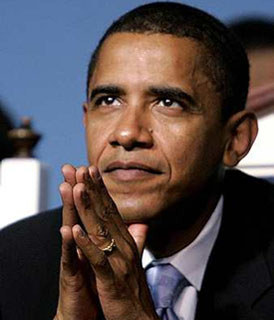75 percent of Americans optimistic about Obama presidency
 Washington, Dec. 10: About 75 percent of Americans are optimistic about Barack Obama''s presidency despite a grim economic landscape, new CBS News poll has found.
Washington, Dec. 10: About 75 percent of Americans are optimistic about Barack Obama''s presidency despite a grim economic landscape, new CBS News poll has found.
That''s the highest level of optimism that any incoming president has garnered in the past thirty years.
Seventy percent were optimistic when Bill Clinton took office in 1993, the second highest level, while 64 percent were optimistic when George W. Bush took office in 2001, the lowest level.
In addition, seven in 10 Americans approve of the people the president-elect has chosen for his incoming administration, and most think his choices will bring experience as well as change to Washington.
There is widespread and growing confidence in Obama on the issues as well.
Seventy-seven percent are confident that he will make the right decisions on the economy, up from 65 percent from September. Seventy-one percent are confident he will make the right decisions on protecting the U. S. from terrorism, an increase of 11 percent from September. And 68 percent have confidence in his decision-making on the war in Iraq, an increase of 12 percent.
Sixty-three percent think Obama will make a good president, including 29 percent who think he will be very good.
More than seven in ten Americans approve of the president-elect''s cabinet picks so far; just 12 percent disapprove.
By contrast, just 58 percent approved of President Bush''s cabinet picks in 2001. Even nearly half of Republicans approve of Obama''s picks. Nearly seven in ten Americans expect Mr. Obama to bring Americans together in the next four years. Sixty-four percent expect the president-elect to bring real change to Washington.
Still, few Americans - 21 percent - think Mr. Obama will to able to accomplish all the goals he set out in his campaign.
The poll was conducted among a random sample of 1,390 adults nationwide, interviewed by telephone December 4-8, 2008.
Phone numbers were dialed from RDD samples of both standard land-lines and cell phones.
The error due to sampling for results based on the entire sample could be plus or minus three percentage points. The error for subgroups is higher. (ANI)